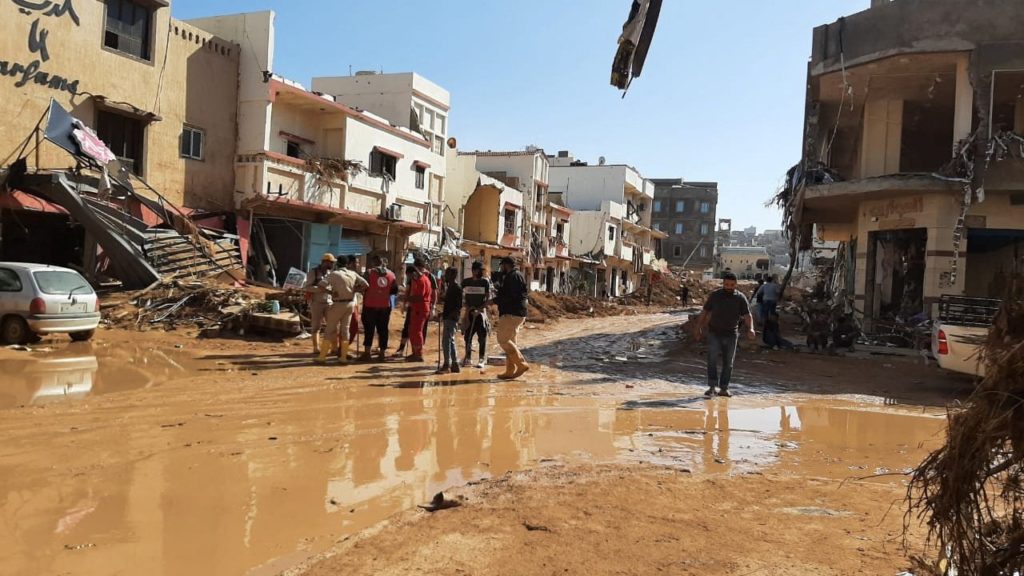As authorities in Libya announced a three-day mourning period following a deadly flood disaster, a Catholic bishop in the North African country expressed the church's closeness to the people, many of whom are injured, missing or trapped by the storm waters.
On Sept. 13, the authorities estimated that over 5,100 people had died and 10,000 were reportedly missing. Some media outlets already put the death toll at 6,000 people. The high number of those missing has provoked fears there will be a sharp rise in the number of deaths from the tsunami-like storm.
"For the time being, we are praying and keeping all in God's mercy," Bishop George Bugeja, a Maltese, who is the apostolic vicar of Tripoli, told OSV News.
"I am in Tripoli (Libyan capital) and the situation here is very calm,” he said, but the “information we have is that the storm happened in Cyrenaica (region), particularly in (the city of) Derna, where there were two dams that did not manage to hold the water and broke."
As a consequence, the bishop said, "the water that came out with mud destroyed anything that was in its way: houses, streets."
Powerful Mediterranean Storm Daniel, including catastrophic rainfall in a short time, triggered the heavy flooding in eastern parts of the country. As the storm pounded the coast Sept. 10, residents said they heard loud explosions when the dams outside the city collapsed, The Associated Press reported.
Derna, an eastern port city of approximately 90,000 people has borne the highest brunt of the flooding. Authorities said 25% of the city had been destroyed, after two broken dam waters swiped entire neighborhoods into the sea. The impact also has spread to other cities.
"The city of Derna was submerged by waves 7 meters (23 feet) high that destroyed everything in their path," Yann Fridez, head of the delegation of the International Committee of the Red Cross in Libya, told broadcaster France24. "The human toll is enormous."
Climate analysts and agency officials have viewed the disaster as a consequence of the global climate crisis, which continues to trigger storms, floods, droughts, famine and heat waves, among other disasters.
But a long running armed conflict is viewed to have exacerbated the disaster, since the fighting has made it difficult to maintain structures such as roads, the dams and buildings. Libya has not had a stable government since the overthrow of late dictator Moammar Gadhafi in 2011. He seized power in the oil-rich country in 1969 and ruled for four decades until he was toppled and killed in a rebellion assisted by Western military intervention.
Since 2014, when the civil war began, Libya has been divided into competing political and military factions. The two sides signed a permanent ceasefire in 2020, but political rivalries continue.
Local disaster responders continue digging through rubble looking for the dead.
"This is a disaster of every sense of the word," a wailing survivor who lost 11 members of his family told a local television station as a group of rescuers tried to calm him. The television station did not identify the survivor, AP reported.
On Sept. 11, the Libyan government appealed to friendly nations and the international relief organizations to send help to the communities affected by the floods. The U.N. said it had mobilized support together with its partners.
"At this time, our thoughts are with the thousands of people being affected there in their communities, we stand in solidarity with all the people in Libya during this difficult time," said U.N. spokesperson Stéphane Dujarric in a press briefing in New York on behalf of the secretary-general.
The appeal for help has triggered global outpouring and calls for support, with relief organizations -- including those from the Catholic Church -- preparing to respond to the floods disaster.
The Catholic Agency for Overseas Development, the official aid agency of the Catholic Church in England and Wales, has said it was deeply saddened to hear the powerful earthquake in Morocco and the flooding in Libya, which have devastated lives.
Ciaran Donnelly, the senior vice president for crisis response, recovery and development at the International Rescue Committee said the organization would be scaling up assistance after conducting an assessment together with the other non-governmental organizations.
The official, however, cited immense challenges with phones down and the heavy destruction hampering rescue efforts.
"This tragedy underscores the urgent need for international attention and assistance as well as for climate action. The situation in Libya has been steadily deteriorating due to years of conflict and instability, compounded by the impacts of climate change," said Donnelly in a news release.
According to the official, globally, climate change has made these extreme weather events more frequent and intense, making it even harder for communities to cope and rebuild, especially in conflict-affected regions.
"We must remember that Libya is not just a country in crisis; it is also a gateway for people on the move to Europe," she said.
The flooding in Libya comes barely a week after an inaugural African Climate Summit in Nairobi re-stressed the urgency in tackling the global climate crisis.

